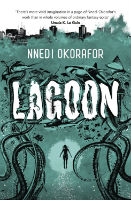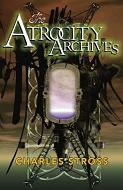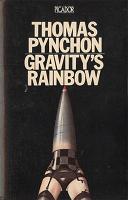 Nnedi Okorafor is a US-born writer with roots in Nigeria; her writing reflects both the country and society she lives in, but, especially in topic and setting, her African roots. Besides being a successful writer she also is a professor at the Chicago State University. She has been nominated for, and has won, a number of awards, most notably the Wole Soyinka Prize for Literature for her first book (Zahrah the Windseeker) and the World Fantasy Award for best Novel with Who Fears Death. Lagoon is her 6th book, with yet another one (Akata Witch 2 - Breaking Kola) also scheduled for publication in 2014.
Nnedi Okorafor is a US-born writer with roots in Nigeria; her writing reflects both the country and society she lives in, but, especially in topic and setting, her African roots. Besides being a successful writer she also is a professor at the Chicago State University. She has been nominated for, and has won, a number of awards, most notably the Wole Soyinka Prize for Literature for her first book (Zahrah the Windseeker) and the World Fantasy Award for best Novel with Who Fears Death. Lagoon is her 6th book, with yet another one (Akata Witch 2 - Breaking Kola) also scheduled for publication in 2014.
Lagoon is a First Contact story, set in Lagos, Nigeria. The aliens have landed – in the sea outside Lagos. The sea is rising due to the huge space ship sitting in it, and the sea creatures (as well as the sea itself) are changing – here be monsters! The city has been scanned with some kind of sonic boom, and 3 people have been taken by a wave 'like a fist of water', have been interviewed, and then put back on the beach. They are Adoara, a professor for marine biology at UNILAG who has problem with her husband and his christian-fundamentalist tendencies; Anthony Dey Craze, a Ghanean rapper/musician, and Agu, a soldier who has just had a violent run-in with his commander and comrades for trying to keep them from raping a women they stopped on the road. Joining them is Ayodele, one of the aliens. They are shape-shifters, so she appears, at least to start with, in the shape of a young woman. She describes the aliens as communicators, as catalysts for change, and as neither our saviours nor conquerors – but here to stay, with us, if we like it or not.
Lagos, as you would imagine, does not take to this easily, but erupts in even more chaos and violence than its usual state.
- The government sees the aliens and their arrival as an attack, especially in the light of the sonic booms and the damage these cause.
- Father Oke, the local Bishop (and rich man, and hunter of witches) sees them as someone to add to his flock, and hopefully fleece, too.
- The boyfriend of Adoara's maid and his friends see Ayodele as their path to riches via kidnapping.
- The local LGBT chapter sees the arrivals of (other?) shape-shifters as their ticket to acceptance.
And so on – everybody is trying/planning to exploit the aliens to their own end, may that be religious, power, money, influence etc.
It is clear to see that especially Ayodele, as the physical manifestation of the aliens, definitely acts as a catalyst, bringing out latent intentions, traits, and exposing morals (or lack thereof) and attitudes when previously separate loyalties conflict. There are times when you wonder if this is a story about aliens and the change they bring, or if it is about humans, human stupidity, greed, religious blindness etc. I leave it to you to answer that one...
The author sets up a substantial number of threads and protagonists, major and minor ones, through whose eyes the story is told – with frequent, and fluid shifts in viewpoint and perspective. And these threads and protagonists are, as we learn, heavily interlinked and webbed together, rather to the extent where you feel that a point is made about interconnections, either as part of the world and/or Nigerian society, or due to the aliens and their influence. Either way, the relationship diagram/notes I kept started to take on slight characteristics of one for a Thomas Pynchon book for a while, although this became simpler as things don't continue to sprawl, but are tied back together (and quite deftly cut off, in a number of cases!).
I found the local culture, societal set-up, and language as alien to me (if not as non-human, obviously) as the actual aliens. Yes, this betrays a certain ignorance on my part in regards to central and western Africa, guilty as charged. Reading up, even superficially, on Nigeria and Lagos, on its history and societal make-up helped with some of the setting I found – should your ignorance be similar to mine then I'd recommend you actually buff up before jumping in with the story, it will help your understanding and your enjoyment ...
A related, but rather different issue was the languages in play, though. Whilst none of the exchanges descended into Iqbo or Hansa, or any of the other local, tribal languages spoken in Nigeria there are extensive parts of the story where the protagonists speak the local patois/street slang. This obviously adds to the setting and the atmosphere, but made it rather hard at times to understand the characters, and follow the events. And, for those who can follow these comparisons, this is much more extensive than Ian McDonald's India in River of Gods, or Lauren Beuke's South Africa; even if you go by the assumption that street slang is street slang, and you will have an idea of how people will talk, without understanding the actual words.
What I found remarkable, even if most likely (and sadly) absolutely correct and historically supported was the way Lagos descended into violence and chaos – some of it related to the actual alien(s) in town, but a lot of it simply people kicking off and acting on grudges and existing tensions – something we witness nearly every time a place, a society, a country faces certain changes and upheaval, but with uncertain parameters and even less certain outcomes. The veneer of 'civilised' society on top of general anarchy is thin wherever you are, and the way the author presents Lagos/Nigeria suggests this is even thinner there, with a much higher baseline in violence and chaos, and a reduced threshold to throw of the restraints of 'civilised' behaviour. This might well be a consequence of Nigeria's history, and entirely correct, but to me she really didn't sell the place (interesting? Hell yeah! Going/being there? Hell no...) to me. The Lagos Tourist Board might have reason for complaint ;-)
Overall I can highly recommend the book – there's much more to the story than I can (and want to) relate here. It's fascinating in setting, even fascinating for its unusual setting; it's an unusual take on a rather well-trodden trope, and it makes you think about humanity, humans, and their (er, our) motivations and desires. A splendid piece of work from a writer who deserves more attention than she gets at the moment.
Out 10 April 2014
Thanks to the publisher for the review copy.
More Nnedi Okorafor
Title: Lagoon
Author: Nnedi Okorafor
Reviewer: Markus
Reviewer URL: http://thierstein.net
Publisher: Hodder & Stoughton
Publisher URL: http://www.hodder.co.uk
Publication Date: Apr 2014
Review Date: 130308
ISBN: 9781444762785
Pages: 320
Format: ePub (Nook)
Price: UKP 13.99
Topic: SF
Topic: First Contact













